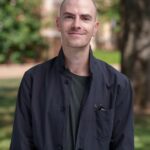2025-2026 Faculty Fellows
2025-2026 Faculty Fellows – Can the Humanities Save Humanity?
The Robert Penn Warren Center’s theme for 2025-26 is How Can the Humanities Save Humanity? Humanities as fields of study and in forms of creative expression are crucial to civic engagement, community, and personhood. But academic humanities have been losing favor on a climate of political, social, and economic polarization. How can the humanities support civic engagement? How can the humanities help us toward a more humane politics? How can the humanities have a reparative function with respect to inequality, partisanship, and violence?
Ajay Batra
Ajay Batra is Assistant Professor of English. He is a literary and cultural historian working at the intersection of hemispheric American studies, slavery studies, and Black studies. His current book project is a study of African diasporic culture and politics in the eighteenth- and nineteenth-century Atlantic World. In addition, he is currently am working on article-length projects that investigate the following topics: (1) the use of enslaved children as fences on plantations across the antebellum U.S. South; (2) militant resistance to slavery in eighteenth-century Antigua; and (3) the history of the concept of “the Black commune.” In concert with his research, Dr. Atra teach courses on African American literature, hemispheric American literature before 1900, and prison writing.
 Matthew Congdon
Matthew Congdon
Matthew Congdon is Assistant Professor of Philosophy. He is a philosopher specializing in ethics, social philosophy, and aesthetics. He write about emotions, interpersonal recognition, moral change, the aesthetics of interpersonal ethical life, and the intersections of ethics and epistemology. His work on these topics has appeared in The Philosophical Quarterly, Analysis, Philosophy, The European Journal of Philosophy, Episteme, and Philosophical Topics, among others. He authored Moral Articulation: On the Development of New Moral Concepts, published by Oxford University Press in 2024. He is currently working on two new book projects: one on the aesthetic dimensions of interpersonal ethical life and one on the philosophy of Iris Murdoch. He is also working on a series of essays on the rationality of emotions.
 Sasha Crawford-Holland
Sasha Crawford-Holland
Sasha Crawford-Holland is Assistant Professor of Cinema and Media Arts and Communication Studies. His research and teaching examine the relationship between media technologies, violence, and social justice, with an emphasis on environmental issues. His current project, “The Temperature Complex: Epistemic Media and the Governance of Perception,” explores how media make sense of heat. He analyze a wide range of technologies that schematize temperature—from surveillance systems to weather apps to digital models—and investigate how they distribute vulnerability to our heating climate. Additional research projects are concerned with contemporary documentary cultures, state violence, settler colonialism, and activist media. His work is published in the Journal of Cinema and Media Studies, JumpCut, Film History, Television & New Media, Synoptique, American Quarterly, and the collection Indigenous Media Arts in Canada. He received a PhD in Cinema & Media Studies from the University of Chicago. His research has received awards from Screen, Domitor, and the Society for Cinema and Media Studies, and has been supported by the Franke Institute for the Humanities, the Mellon Foundation, USC Annenberg, and the Social Sciences and Humanities Research Council of Canada.
 Julia Phillips Cohen
Julia Phillips Cohen
Julia Phillips Cohen is Associate Professor in the Program in Jewish Studies and the Department of History. She is the author of Becoming Ottomans: Sephardi Jews and Imperial Citizenship in the Modern Era (New York: Oxford University Press, 2014), which was awarded the 2015 Jordan Schnitzer Award in Modern Jewish History, the 2015 Barbara Jelavich Prize of the Association for Slavic, East European, and Eurasian Studies, the 2014 National Jewish Book Award for Writing Based on Archival Material, and honorable mention for the 2014 Salo W. Baron Book Prize, the 2014 the National Jewish Book Award for Sephardic Culture, and the 2015 British-Kuwait Friendship Society Book Prize. Together with Sarah Abrevaya Stein, Cohen is also co-editor of Sephardi Lives: A Documentary History, 1700-1950 (Stanford: Stanford University Press, 2014), which won the 2014 National Jewish Book Award in the category of “Sephardic Culture.” She has received a number of grants to support her work—including fellowships from the National Endowment for the Humanities, the Stanford Humanities Center, the Foundation for Jewish Culture, the Memorial Foundation for Jewish Culture, the American Research Institute in Turkey, the Herbert D. Katz Center for Advanced Judaic Studies of the University of Pennsylvania, the Oxford Centre for Hebrew and Jewish Studies, and a Vanderbilt Chancellor’s Award.
 ZZ Packer
ZZ Packer
ZZ Packer is Assistant Professor of English. Her fiction has appeared in The New Yorker since 2000, and she’s additionally published fiction in Harper’s, STORY, Ploughshares, GRANTA, Zoetrope All-Story, Best American Short Stories, Best Non-Required Reading and, most recently, 100 Years of The Best American Short Stories and The New York Times Magazine‘s “The 1619 Project.” She has been contributing nonfiction to The New York Times Magazine since 2000. Her nonfiction has also appeared in The Washington Post Magazine, The American Prospect, The Oxford American, The Guardian, The New York Times Book Review, The Believer, Essence, O Magazine, GQ, PORT, and online at Salon, Newsweek, and The New Yorker. She has appeared on MSNBC as a Huffington Post contributor as well as the BBC World News. She is the recipient of a Guggenheim Fellowship, a National Endowment for the Arts Fellowship, a Rona Jaffe Foundation Award, a Whiting Award, a Kentucky Book Award, a Commonwealth First Fiction Award, and an ALEX Award. She was a PEN/Faulkner Award finalist and a National Book Award 5 under 35 winner. GRANTA Magazine named her one of “America’s Best Young Novelists” and Smithsonian Magazine named her one of “America’s Best Young Innovators.”